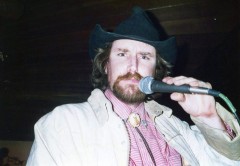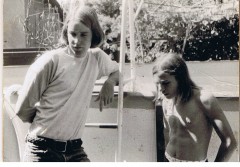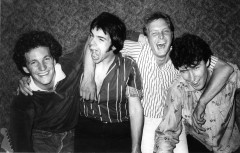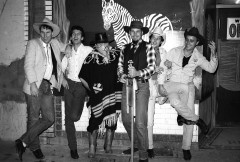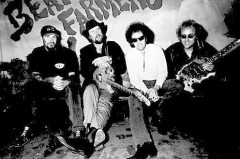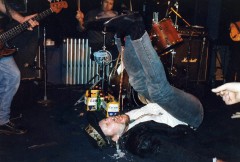Cover Story
Reimagining DAN McLAIN, starring Country Dick Montana and a cast of thousands
Human nature is an ever-evolving magic trick out of the act of contrition: bowing one’s head to the laws of physics, and discovering how to work within its unprejudiced parameters. For the sensitive and hyperaware, it’s simply a matter of constant invention, and re-invention, of Self. Because, when you get right down to it, we all invent ourselves–our psyches, our ego, our sense of who we are is predicated entirely upon a sliding scale of consciously choosing how we perceive ourselves, and then projecting that persona out into the world for others to celebrate, navigate, dance with, or do any of the multitude of insane things that human beings are capable of.
Well, if there is one thing that unites so many of us, or divides us with equal veracity into competing tribes, it is our passionate identification with music. Or, more specifically, the obsessive, cultish, FUNDAMENTALIST desire to promote one style of music, or one particular band or artist, to such an exclusive degree that, as their supporters, we become the very fanatics that the designation “fan” is derived. Talk about the passion! Every legend has their legions: those lucky few who understand that they have borne witness to true greatness, experiencing a moment that rocked them to the core of their being. It’s a very personal thing, which makes it all the more incredible when you somehow manage to share that feeling with a roomful of others.
But time, and the oh-so-human habit of distorting events through the fog of memory, can take the once mighty Klieg light of an experience and reduce it to a faint pinhole when faced with the task of conveying or documenting such a force of nature, with all of its visceral power intact. Those are perhaps the true instances when you REALLY had to be there. Because, to share a moment with this force of nature was to never perceive space and time in quite the same way again. The real veterans of the San Diego music scene will know how true all of the above is, when speaking about that force of nature known as Dan McLain, aka Country Dick Montana of the Beat Farmers.
This month, on November 8th, marks the twentieth anniversary of McLain’s passing, which is extraordinary because an entire generation of bar patrons and music lovers weren’t even born when McLain was redefining the role of charismatic showman, and community builder, in the swamp-infested world of pop culture and rock ‘n’ roll. McLain was a master at self-promotion, understanding the power of the press by tearing a page from Greg Shaw’s (Who Put the Bomp!) playbook, inventing fanzine after fanzine in the nascent days of promoting his passions.
McLain possessed the sophisticated swagger of a master confidence man, with the charm to draw you into his circle and talk you into putting your ass on the line in his conspiracy of taking over the world from the squares. But numero uno amongst McLain’s talents was to project the visage of someone who is having an absolute ball 24/7, with the ability of seducing barroom after barroom of patrons into joining him in his hedonistic binge of ecstasy.
The traditional sacraments of this bizarre love cult involved the ritualistic swigging of longneck bottles of beer and raucous rock ‘n’ roll dredged from the heart and crotch of America. Eventually, all sense of normalcy ceased, and anyone lured into this anarchist lifestyle had no choice but to follow its pied piper to the palace of wisdom via the road of excess.
*******************************
ALIENS TO SET DOWN AT BODIES
Saturday will feature, from L.A., the long-awaited return of the Rockin’ Rebels. In this reporter’s opinion, the Rebels are THEE ultimate rockabilly band (and in the last six years, I’ve seen ’em ALL, baby.) Dishin’ out earth shakin, hard-core, ‘[f**k] tomorrow, let’s rip this joint’ rock like their very souls are on fire, the Rockin’ Rebels are one of the few groups in the world capable of living up to this massive hype. Weeknights at Bodies are gettin’ so good that many people are quitting their day jobs and becoming drug dealers just so they can hang out more. This week is a good example of why unemployment will skyrocket in the coming months. FILLER: It was reported recently that a disc jockey at 91X played five records in a row at the correct speed and properly back-announced nearly 50% of ’em. – from Dan McLain’s The Weekly Dirtbag #7, July, 1983.
**************************
Daniel Monte McLain was born in Carmel, California, on May 11, 1955. He was the oldest of three siblings, including a sister Debbie, and a brother Pat. Their father, Monte McLain, was a pharmacist, most likely influencing young Dan’s passionate interest in chemical stimulants: the rocket fuel in his jet propelled lifestyle of sex, drugs, and rock ‘n’ roll.
When McLain was 15 he met neighbor Joel Kmak (two years his junior) just as McLain was entering Grossmont High School in La Mesa. He soon became a fixture at the Kmak residence. “My dad loved him,” says Kmak. “He called him Big Dan. We would throw Christmas parties and Dan would always sit in the kitchen with a legal pad and write down his observations. I would just be blown away talking to him, he was so amazingly intelligent, and so funny, too. My dad taught English literature at Emerald Jr. High School for 20—25 years. One day, when Dan was complaining about something at school, my dad told him if he was so upset he should get off his ass and do something about it. It must have sparked something inside him because he ran for student body vice president and he won the election. That experience seemed to give him the confidence to try his hand at anything.”
That confidence gradually ramped up after McLain graduated from Grossmont in June of ’73. After a stint of delivering pizzas and attending classes at Grossmont Junior College, he eventually married his girlfriend Debbie in Las Vegas in late 1976, right around the time he opened his own record store at 5704 El Cajon Boulevard. He adapted his middle name and called the place Monty Rockers.
The fanzine Rude Situations, from early 1978, provides a perfect snapshot of the era. There is a full-page collage by McLain, advertising Monty Rockers with the handwritten tagline: We Have It All. A brief interview with Paul Sansone reveals McLain’s mindset before he fully committed to be a professional musician:
Sansone: What is your favorite kind of music?
McLain: Conway Twitty’s “It’s Only Make Believe,” Gene Vincent’s “Pink Thunderbird,” Generation X’s “Your Generation.” The Beatles, Stones–anything that moves me. Blondie. I love the Doors.
What prompted you to open a record shop?
McLain: One way or another I knew I would have to make it in music because I knew I couldn’t be someone’s normal employee. I started out at 14 playing in bands with Steve Kelly and Joel Kmak (who are in the Hitmakers), but I got frustrated just playing Stones, Beatles, and the Kinks. It was too late to be appreciated and too early for New Wave, so no one liked the band.”
When Sansone asked about his “New Wave sex life” McLain confessed that he was recently separated from his wife, “so as far as my New Wave sex life is concerned, I haven’t even started yet.”
Sansone: Is New Wave music substantial enough to exist for a long time?
McLain: It does appeal to a certain kind of person. It has plenty of life in it. But it will always be underground. It is more fun to like something not many others like.
Sansone: Why don’t you go to L.A. where there is a scene?
McLain: I don’t like people in L.A. I have met maybe one, maybe two, no–three people that I can carry on a conversation with in all of L.A. People here are easy to get along with. They don’t have a status trip because no one in San Diego has any status.”
When Sansone asks What about the San Diego scene? What is holding us back?
McLain: Lack of an outlet. There is plenty of potential here. If I had money I would buy a club. I have spoken to about 30 or 40 people about a permanent club or a one-night thing, and I come up with nothing.
**************************
In spite of the frustration of seeing his marriage end in divorce, and finding the demands of running a business too much to handle, McLain would soon learn to channel his substantial energies into not one, but two major San Diego bands: the literate punk menace of the Penetrators and the maximum R&B roots garage rock of the Crawdaddys. Both bands managed to develop substantial followings on their own, and by 1979 there were two singles available by the Penetrators (“Untamed Youth” and “Sensitive Boy”) and an LP and EP by the Crawdaddys (Crawdaddy Express and 5X4). In the span of two years McLain had managed to make a big dent in the local scene–a scene that he was largely responsible in forming.
McLain had a natural talent for creating connections amongst disparate social circles. His skills at community building were honed through the creation of his own irreverent fanzines, promoting San Diego musicians, clubs, and businesses, beginning in the late ’70s with Snare and continuing into the early ’80s with New Hippie, Hobogue, and The Weekly Dirtbag–all precursors to his ultimate fanzine creation in 1985: The Beat Farmers Almanac.
“That’s one of the things that Dan did that was different,” says Kmak. “He cross-pollinated. He was smart enough to do that.
“Playing music in San Diego, there are a lot of parallel universes. I’ve tried my hand at everything in this town. I thought I’d get in a cover band and make some money playing top 40. Well, guess what? That’s a whole parallel universe: all the hot people in that scene don’t even know anybody else in this scene. And, as I found out, you can’t make any money quickly, so maybe I’ll try the cover country rock thing, the KSON scene. Well, that scene has its own people, right? And never the twain shall meet.
“But Dan had the balls to go out and meet people and be Dan. He went out to a lot of dive bars back then. The punk movement really helped, because all of a sudden people were interested: that’s when it became stratified. Back in the 1970s, you would have all these diverse elements on the same bill: a reggae/ska band playing with a hardcore punk band in addition to a power pop band. And then, all of a sudden, it was hardcore punk only–you wouldn’t have a Hitmakers or a Crawdaddys opening for a punk rock show. But by then the local music scene had exploded so much that Dan had the balls to go into those separate scenes and pick people. Before punk happened, those scenes didn’t even exist. There were cover bands and high school dances, and that was it. But by 1981 there was at least a toehold of different bands performing because of the punk movement. And Dan was smart enough to go in and cross-pollinate. It wasn’t ‘Oh, it’s gotta be this or it’s gotta be that.’ God, it could be country or a little of this–we could take country and make it a little punk. Hell, Johnny Cash did it, why can’t we?”
And eventually, that’s exactly what McLain did. But first there would be more woodshedding to attend to.
********************
BODIES FARTS IN THE FACE OF LOCAL CLUB SCENE…
Daring dive bar displays wreckless booking tendencies… Bodies, a shady niteclub, which caters exclusively to hosemonsters like yourself, has for the last four weeks booked the most exciting and adventuresome acts in San Diego County. Bands from as far away as Los Angeles and Phoenix have also fallen victim to the lure of Bodies’ sleazy mating call. Boasting an anything-goes parking lot and claiming to feature in-door rest rooms, Bodies is proudly destined to remain the favorite watering hole, not only of artists and musicians, but also of scuzzy dance-hounds like you and your crap-weazle friends. – from Dan McLain’s The Weekly Dirtbag #1, January, 1983.
************************
After spending several years supplying the backbeat and the backbone to the Penetrators and the Crawdaddys, the urge to be closer to the lip of the stage took over and McLain formed a side project: Country Dick and the Snuggle Bunnies. An alter-ego had been born.
Or perhaps stolen. You know that old maxim: talent borrows, genius steals? Well, Dan McLain was clearly a genius. In 1973, local rock mainstay 101 KGB-FM produced the first Homegrown album, with local musicians contributing songs celebrating all things San Diego. Over the next decade, the Homegrown series produced nine LPs, but included on that very first LP is a song called “Dago From Diego.” And the name of the artist? Country Dick & City Slick.
***********************
Simultaneous to McLain forming the Snuggle Bunnies, local guitar legend Jerry Raney, of Glory fame, was looking for a change of direction. “I’d actually written quite a few songs, but pretty soon I got tired of just playing around. It was starting to bug me that we couldn’t draw more people. We played the Bacchanal one Saturday night as the Shames, which held about 750 people; it was a pretty big place. And I think we had about 250 people in there, but it looked empty. And I just said, ‘That’s it. I gotta stop doing this.’
“But it only took about two weeks before I got this call from Country Dick: ‘Hey, Raney, wanna start a musical mobile pleasure unit?’ And that was the start of the Beat Farmers.
“Dick was actually a big fan of Glory. He and his friends pretty much figured out that Glory was the American Rolling Stones, and when he was the junior class president of Grossmont High School, he hired Glory to come in and play.”
Kmak says that when he and McLain were at Grossmont High, Raney “was like a rock god to us; he was our idol in high school, and all of a sudden he’s in Dan’s band! I’m like ‘Man! How did he do that?’ Dan realized early on that all you had to do was ask people, right? And have a product that they want to be part of.”
Raney says that “when Dick called me, he was still with the Penetrators, but he had also struck out and started doing Country Dick and the Snuggle Bunnies. But then that band had just broken up. I was there at Bodies watching their last show and Dick was rolling all around on the floor with the microphone: ‘Don’t leave me Bunnies, don’t leave me!’ So I walked up to him that night and said ‘The stuff you’re doing is pretty cool, and I think that you’ve got a real good chance of making it.’ And within a few days his mind went ‘Do-ing! Raney’s not playing in a band now.’ So I was the first person Dick called. I didn’t really know Buddy Blue [aka Bernard Siegal] and Rolle [Dexter Love]. I’d seen the Rockin’ Roulettes play: that was Buddy’s band. And he was writing all these songs. And Rolle played standup bass. He had only been playing for about a year, but he got good quick playing that slap bass.”
The newly christened Beat Farmers performed at Bodies (near San Diego State University) as well as at a puny, East County hole in the wall called the Spring Valley Inn. Fuelled by an endless sea of absurdist humor (increased exponentially by an open bar tab) and a clutch of great originals and covers reflecting the absolute pinnacle of what American roots music has to offer, they started experimenting with the dynamics of their sound, and the performance art McLain crafted for his over-the-top creation of Country Dick Montana. What the Farmers invented during their stint at the SVI would color and shape the next dozen years (and beyond) of the Beat Farmers’ career. They called it Cowpunk, and after being together for only a couple of months, they decided to record a demo tape at the SVI for the purpose of shopping it to record labels. Almost immediately, they were enthusiastically embraced by a young A&R guy from Rhino Records named Dan Perloff, who managed to convey his passion successfully to Rhino’s owners Richard Foos and Harold Bronson that he’d stumbled upon the NEXT BIG THING. To understand what put Perloff into such a lather, you are highly encouraged to check out the 2003 archival CD Live at the Spring Valley Inn, 1983. It just might stand as the primo artifact of the Beat Farmers’ entire career.
On page 261 of The Rhino Records Story, Harold Bronson writes: “Danny Perloff, our college rep in the San Diego area, was enthused about a new country rock band named the Beat Farmers. We signed them and gave them a recording budget of $6,000. We broke the act and sold an impressive 50,000 albums. Before we could even mention having them record a follow-up for us, their manager signed them to Curb Records without even giving us a courtesy phone call. If Curb had been able to make the Beat Farmers into a hit act, we would have benefited with more record sales from new fans wanting to hear their first album, but Curb’s results were modest and we saw no upswing in sales.”
“I saw the Penetrators a few times,” says Perloff. “I was at San Diego State from ’79 to ’83. I also saw Country Dick and the Snuggle Bunnies open for the Blasters and Rank and File; I thought they were great. When I started working for Rhino, I was a college rep for Rhino, and I was going into the El Cajon Tower Records where [Penetrators] Chris Sullivan, Chris Davies, and Mark Williams worked. And they told me that the Penetrators were breaking up and that Dan had started a new thing called the Beat Farmers with Jerry Raney and this rockabilly guy named Buddy. I was living in La Mesa and Sullivan was the one who told me that the Beat Farmers were playing at the Spring Valley Inn every Friday and Saturday. And I became a super-regular.
“So I started bringing in a tape recorder and I sent the tapes to Gary Stewart, who became the head honcho in Rhino’s A&R Department, which at the time had hardly any employees. We were both really into the Blasters, and Rank and File, and the Long Ryders–all the roots stuff. So Gary came down to see ’em and that’s kind of how the conversation started. When I graduated from State, I got a full-time job up at Rhino. They were doing reissues: they were doing the Turtles, Bobby Fuller Four, and some other compilations, a lot of novelty at the time. They put out some finished recordings of some newer artists but they didn’t really work them or do anything like that. In the early days, on vinyl only, long before CDs, they put out some of the L.A. bands like the Naughty Sweeties, the Zippers, the New Cats, and nothing ever happened, so I think they were dismissing the idea of bothering to have a label; they just wanted to keep putting out greatest hits packages and anthologies. But we kind of kept on it and we had enough connections to get them on bills, so the first time they came up to L.A. they played the Music Machine with Los Lobos and the Long Ryders. Packed to the rafters there, and every time thereafter they played to sold-out crowds. Like opening for the Bangles. And then, of course, Dan was becoming best friends with everybody. Being the drug and drinking buddy, he was just a funny guy. And he’d be in the middle of the floor afterwards in his duster hat handing out the Beat Farmer Almanacs. He just started building up a buzz really quick, when you saw the guy operate. And little by little we talked the guys at Rhino into letting us do this. Harold Bronson wrote a book and he glosses over them in his memoirs. He said we had a $6,000 budget; it was more like $4,000. We were calling in favors: Steve Berlin produced it. He was hot at the time because he produced the first Los Lobos EP that won a Grammy. We had people from the Long Ryders, Rank and File, the Plimsouls, the Bangles: they all were on that first record. Because they were friends, nobody was charging a penny, and everyone just kind of came to the studio and did something.
“I think the record was recorded in the summer of ’84, and they had already done a ton of shows in L.A. Their debut, Tales of the New West, was released on February 1, 1985.
“Since I was the rep, I had to go down to San Diego once a month anyway to do inventories at all the stores and have them order their Turtles Greatest Hits and all that other horseshit. But we had promotional pictures taken at Rhino on a Thursday or a Friday, and I drove straight down to San Diego to the Spring Valley Inn that night and gave every single person who walked through the door one of those photos and everyone was super excited. ‘Wow! These guys have their own photo and their own record.”
In the official Beat Farmers bio for Rhino (which contains many fictional flights o’ fancy), McLain writes: “Country Dick: age unknown.” “He did not want ‘Dan McLain’ used on anything,” says Perloff. “Like if he had any Crawdaddys stuff that mentioned his name there would be a black line through it.
“He just really wanted the persona. The persona was it. He’s Country Dick. Don’t call me anything else, my real name doesn’t mean anything. He was like a method actor: he truly was, because people from the old days knew who he was. But it didn’t take long to know that he didn’t want to be called Dan, that’s for sure.”
In that very first black-and-white 8×10 that Rhino sprang for, three of the four Farmers appear smiling and eager to please in their own demented way, with Rolle, Jerry, and Buddy all wearing wide smiles. But McLain, now fully transformed into the mega-alter-ego of Country Dick Montana, has his head cocked to the side, his lips forming a cross between a smile and a smirk, the now trademark Van Dyke splashed across that mug of his, with the standard issue uniform of Bolo tie, white button down shirt, and cowboy boots. Later the full regalia would include a ten-gallon boater and a floor-length trench coat. Few people in rock ‘n’ roll have as much style and panache as McLain, but add raw talent and a swimming pool of personal charm and it all added up to a dangerous amount of mischief. The Beat Farmers were ready to take the vibe of the Spring Valley Inn out into the world at large. And the timing couldn’t have been more perfect.
Regarding musical influences, McLain told Jack Burditt of BAM, “The first visual evidence I had was Ray Davies in the early ’70s. The Kinks were incredible and Ray was a delightful front man. They were all really drunk, sloshing the shit around, falling into the crowd, and coming out for the encore with no pants on. What I do is an extension of what I saw Ray doing–that garbage mentality.
“I think we put something together that a broad cross-section of people can enjoy. I think most people have a basic, common taste. Kind of like Los Lobos: you have to be an asshole not to like them.”
Did you see what McLain did there? In a wonderful verbal sleight of hand, he implies that if you don’t like his band, you’re an asshole. City Slick indeed.
Raney says, “We didn’t know how popular we had become until we went out on the road for the first time. Our manager got us a booking agent and we were off, and we were pulling into places like Chicago and just going, ‘Wow, everybody knows us, the place is full, and they’re singing along with our songs.’”
That initial momentum took the band to England to record their second record, the EP Glad and Greasy. In spite of the success brought on by Tales of the New West, the Beat Farmers started looking for broader pastures in which to distribute their wares. Compared to the modest reach of independent Rhino Records (although that would change when they merged companies with Warner Elektra Asylum soon thereafter), the Farmers decided to switch labels and moved over to a multi-album deal with MCA-distributed Curb Records in time for their second long-player, Van Go. On the eve of the LP being released, Blue decided to jump ship and pursue a solo career. Local singer/songwriter/ guitarist Joey Harris (of Speedsters and Mentals notoriety) was tapped to fill the vast hole that Blue’s departure created.
“Buddy really was a serious musician,” says Perloff. “He got to a point where he just didn’t like the Country Dick aspect of the band anymore [represented by “Happy Boy” and “Lakeside Trailer Park,” etc.]. That just wore on him: we’re not a comedy act. What’s going on here, ya know? But after two albums and the EP he quit on his own, rather than getting canned. And then he started the Jacks, and he started the swing thing.”
From 1986 until 1995 the Beat Farmers toured constantly, putting out albums every couple of years through Curb Records, until the band managed to get out of their seven-record contract in 1993.
In 1991, McLain was treated for a thyroid condition, but you wouldn’t know it from the band’s appearance on the Late Night with David Letterman program, when they performed Harris’ “Hideaway.”
They released two albums for the Austin-based Sector 2 label: 1994’s Viking Lullabys and 1995’s Manifold. And after a dozen years of constant activity, the entire enterprise came grinding to a halt when Dan McLain suffered a heart attack at the Longhorn Saloon in Whistler, British Columbia, three songs into the night’s gig. The remaining Farmers dissolved the band three days later, on 11.11.95.
In a road-diary piece, written by stage manager Ross “D. Boss” Nichols for the San Diego Reader, he describes McLain’s last few moments with chilling intimacy: “I was watching Dick, not for his performance, but for possible equipment failure with his drum kit. Most occasions it was a microphone slipping out of a mike stand or cymbal hardware coming loose; he’d beat on those drums so damn hard! Between the last 10 to 12 measures of ‘The Girl I Almost Married’ I could tell something wasn’t right with Dick. First it was in his face, this look of sheer pain, as if someone impaled him with a knife, or more like a sword, straight through his back. From his waist to the top of his forehead I could see he was completely paralyzed, yet he managed to keep his arms and legs in synch without missing a beat. The song ended and Dick semi-collapsed forward onto his drums… [our soundman] Tommy came flying up from the soundboard. Tommy looked at me and said, ‘GET HELP NOW!’
“I’m not sure of the exact time the coroner pronounced Dick dead, but the band, a sold-out house of fans, Tommy, and I saw Country Dick Montana and the Beat Farmers end 13 years of barroom antics and shenanigans at approximately 11:05 PST, due to an aortic aneurysm.”
*************************
As Roy Batty in Blade Runner understood, he who burns twice as bright, burns twice as fast. By all rights when Dan McLain dropped his body and gave up his wicked ghost of a spirit, he had lived the life of an 80-year-old, even though his birth certificate said otherwise. McLain was crazy like a fox–eternally mischievous, with a mucho gusto joie de vivre that dusted the competition when it came to enthusiastically seizing the day.
At the time of his death, McLain was working on a solo album titled The Devil Lied to Me. It was released in 1996 on the Bar/None label. The guy deserves a box set commemorating his singularly crazy ride. A&R man Dan Perloff says, “McLain was so far ahead of his time in terms of branding. It was almost like he was P.T. Barnum.” Musician David Fleminger says, “I can’t imagine the San Diego music scene without the efforts of Dan McLain.”
Joel Kmak feels that toward the end McLain was “just tired. He burned it so hard. He burned it for everybody. He would make people party! People who wouldn’t necessarily want to party, and then they would enjoy it. How much energy does that take?
“Who else could insult the crowd and make them love him up even more? ‘Wait, my boot is sliding off your face.’ It’s just the way he was–he could diffuse a fight. He could be high on mushrooms, acid, and be drunk off his ass, and still be smarter than anybody in the room, by tuning in to what needed to be done: he had that gift. He could have been president of the United States if he wanted. [laughter] Or at least Speaker of the House.
“When Dan passed away everyone kind of went to their little corners again. I thought we’d all learned something from Dan. But at the end of the day, Buddy went into his corner, Joey goes to his corner, and Jerry goes to his corner. I think it’s endemic of the whole situation in the music scene: everybody goes to their little corners.
“It takes a lot of energy to change that dynamic, and it killed Dick at 40. I did it for a while, being in five bands simultaneously, attempting to remain open. But Dan was able to bring everybody together. He was kind of selfless that way, even though he definitely made himself the focal point of a lot of things, but he was selfless in that way, too. With all the writings, the crazy writings, he would draft people into it. He was this cliché: ‘Larger than life,’ but it takes somebody like that.
“I try not to be a bitter old man by having fixed ideas of what’s good or bad, and I’ll go to the Soda Bar; there’s so much talent in this town, and it’s always been that way: so much good, young talent. I wish Dan were alive to see this, he’d probably do something incredible with it. Think about it: the Internet wasn’t even around when he died.
“I miss him terribly. But for some reason it seems poetic, the way that he went out. You couldn’t have written it any better.”










